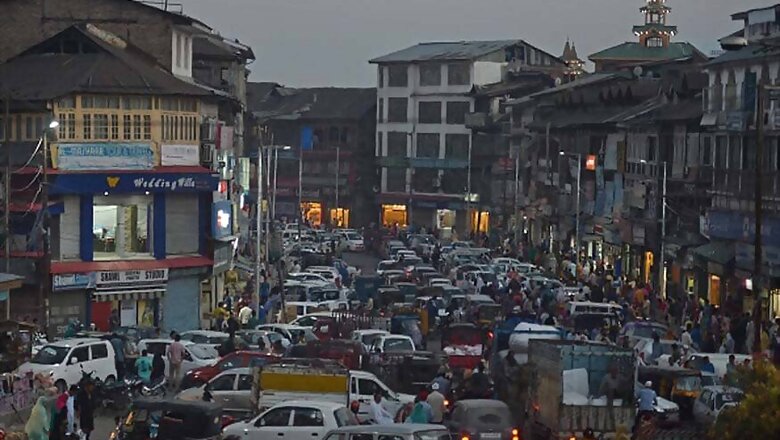
views
New Delhi: The Supreme Court is expected to hear on Monday petitions filed against Article 35A which relates to special rights and privileges of the permanent residents of Jammu and Kashmir. The provision allows the state legislature to define permanent residents of the state, which in turn allows these residents to own property, apply for government jobs and settle down in the state.
The hearing will be keenly watched in Kashmir where separatists claim the challenge to the provision is aimed at changing the state demographics. Also keeping track will be associations of Kashmiri Pandits who were forced to flee the state in early ’90s.
The issue has its genesis in the three petitions which have challenged Article 35A. Here’s a look:
The Petition That Started It All
The first petition was filed in 2014 by Delhi-based NGO We the Citizens. The petition contends that “Kashmir never separated from the federation of Indian dominion.”
To buttress this point, it states that Jammu and Kashmir had already acceded to the Indian dominion under the Government of India Act, 1935 and that a new instrument of accession was signed by the Dogra ruler in 1947 to only “remove doubt, confusion or ambiguity”.
The petition challenges the constitutional validity of orders passed by the president, first limiting the powers of Parliament to make laws for Jammu and Kashmir and then allowing the provision on permanent settlement.
“The President of India under the garb of a temporary provision i.e. Article 370 (1) cannot amend the Constitution by incorporating a new Article of permanent nature,” reads the petition.
Article 35A was inserted in 1954 through the “Constitution (Application to Jammu & Kashmir) Order 1954”. These orders were passed according to powers given to the president under Article 370.
The petitioners also argue that “no special provision was made in the Indian Constitution giving special status/treatment to the state of Jammu & Kashmir” as four representatives from the state were part of the Constituent Assembly which gave shape to the Indian Constitution.
The NGO has also said that by Article 35A, two classes of citizens have been created, which is fundamentally against the principle of equality enshrined in the Constitution of India.
Petition by West Pakistan Refugees Action Committee Cell
After the first petition in 2014, the West Pakistan Refugees Action Committee Cell moved the apex court through a writ petition in 2015. Its primary contention was that human rights of the refugees who crossed over to the state post 1947 were grossly violated.
The petitioners argue that West Pakistan refugees have been living in the state for more than four decades, but are still deprived of their rights to property, vote or be recognised as permanent citizens.
The petition has also relied on media reports to brief the court about the living condition of these refugees.
The petitioners have argued that rights of these refugees must be similar to those who migrated to West Pakistan on their own, but returned.
The petition highlights the Resettlement Act of 1982 which was passed by the J&K legislature and which gave such persons and their children the right of permanent citizens. The judgments cited by petitioners show that the courts have earlier noted that the plight of these refugees were such that they occupied an “a highly anomalous position in the state”.
‘Why My Property Can’t be Mine?’ A Kashmiri Pandit Lawyers Plea
The last of the three petitions was filed by Delhi-based lawyer Charu Wali Khanna.
“Article 14 of the Constitution gives a fundamental right to equality before law. But 35A is heavily loaded in favour of males because even after marriage to women from outside, they will not lose the right of being permanent residents,” she has told the court.
Her argument was that while a woman from outside the state shall became a permanent resident on marrying a male permanent resident of the state, a daughter who is born state subject will lose her permanent resident status on marrying an outsider.
“We are talking of NRI voting rights, but look at where we are stuck?” Khanna told News18. She has stated that this is primarily because of the ‘discriminatory laws’ which brands a woman as an “out of caste” once she marries a non-Kashmiri.
She has argued that such laws only “perpetuate power politics” which leave behind women who are trying to claim their own spaces. She has also argued that this law goes against the principle of ‘Sabka Saath Sabka Vikaas’ put forth by the Modi govermment.
The petitioner cites the Dogra legislation of 1927, which was in existence before the controversial Article 35A was included. “The 1927 law was drafted for a different purpose and being a pre-independence law, it should not be given any importance,” Khanna told News18.
The petition notes the transfer of power after Independence and argues that the Instrument of Accession signed by Maharaja Hari Singh in 1947 is no different from that signed by “500 other rulers/kings” which wiped out all previous territorial allegiances.
“We are entitled to property rights on inheritance basis, but that is limited. But what if I have property, and I die. Will my husband and children not be entitled to it? The Kashmiri women who have married outside are being denied admission for their children and even the gains of the PM Scholarship scheme. How can it be justified? A woman who has lived her whole life in J&K, her children are being denied rights just because she married an outsider. This is creating a situation of radicalization and thereby people will be forced to move outside,” the lawyer told News18.




















Comments
0 comment